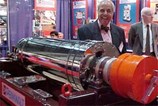Pennwalt India Seeks North American Equipment Business

"We can't come here and offer something that's just good," says company chairman/managing direct S.D. Kashyap. "We offer superior quality, finish, and designs that as good as those of our US and European competitors."

The company's roots go back to 1959, when Sharples Corp. established the business to do process engineering in India in 1959. Eleven years later, the Sharples-Stokes Div. of Pennwalt Corp. turned it into a public limited company (in which Pennwalt held a 49% share). The company began manufacturing the Sharples-Stokes Super-D-Canter centrifuge in a new facility in 1978.
Other agreements followed. In 1985, an arrangement with Germany's Feld & Hahn, GmbH, opened the door to design and commissioning of semicontinuous vegetable oil refining and fat splitting plants. Three years later, it received a license from another German firm, M/S Schmidding-Werke (Cologne) to fabricate, supply, install, and commission falling film fatty acid and glycerine distillation facilities in India.
The company also expanded in other areas. In 1985, an arrangement with Pennwalt's Wallace & Tiernan Div. gave it rights to manufacture, install, and commission chlorinated and related water treatment equipment. The same year, it also licensed rights to produce hose pumps from the Netherlands' M/S Bredel. In 1988, it began anticorrosion apply PVDF and ECTFE fluoropolymer coatings on chemical process equipment. Austria's M/S Alois Gruber currently provides technical support and semifinished parts for the business.

Despite its accomplishments, Pennwalt faced a challenging future when Pennwalt Corp. divested its 49% share of the business in 1990. Kashyap, who worked for the old Pennwalt, was chosen to head the newly independent company. He wanted Pennwalt India to be recognized as a high-quality chemical process equipment producer. Still, breaking into US markets proved tough.
"Working for the old Pennwalt, many people in the chemical industry new me personally, and my reputation helped. I could also show references from Pennwalt's old president and vice president," Kashyap explains. "Our products have good specifications, and a knowledgeable professional knows very quickly when something is well-made.
Even so, Pennwalt India underwent greater scrutiny than most domestic firm will ever faced. Customers wanted to know where Pennwalt bought its raw materials (generally first-tier US and European producers). They reviewed the company's fabrication processes (similar to US and European competitors).
"We sold one machine in the US and a competitor's salesman came in and got the customer really worked up," says Kashyap. "So he hired two separate consultants to spend the day looking over our centrifuge. The first one said everything was perfect, the other didn't like some of the paint job.
"That was the extent of the problems. When the salesman called him after the inspection, the customer said he could have an appointment if he brought a check for $1,925 to compensate for the cost of the two consultants," laughs Kashyap.
Pennwalt India used Chem Show '99 to display its Super-D-Canter solid bowl continuous horizontal centrifuge. The flexible design permits liquids clarification, solids classification, solids concentration, and dewatering. It provides continuous operation and does a good job of handling feed variations. The unit is capable of separating particle sizes from a few microns to 6 mm dia and slurry concentrations of 0.5—65.0%.
For more information: S.D. Kashyap, Chairman, Pennwalt India Ltd., 507, Kakad Chambers, 132 Dr. Annie Besant Rd., Worli, Mumbai-400 018, Maharashtra, India. Tel: +91-22-790-6630. Fax: +91-22-367-7388.
By Alan S. Brown
